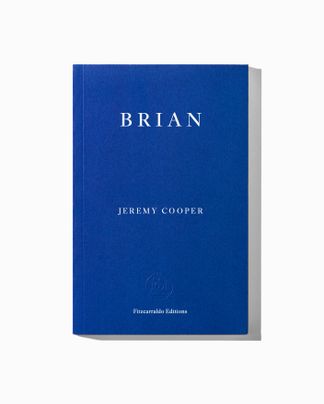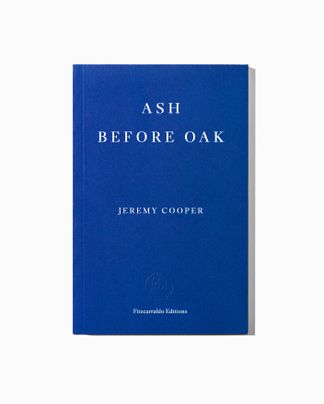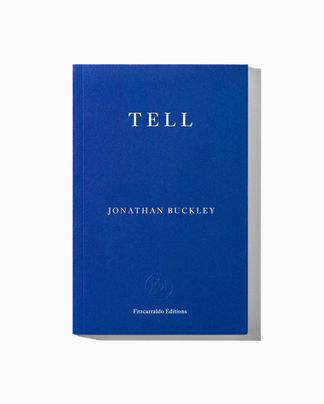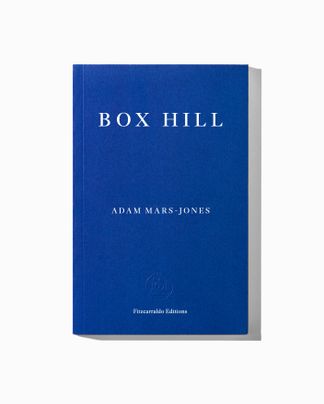In Bolt from the Blue, Jeremy Cooper, the winner of the 2018 Fitzcarraldo Editions Novel Prize, charts the relationship between a mother and daughter over the course of thirty-odd years. In October 1985, Lynn moves down to London to enrol at Saint Martin’s School of Art, leaving her mother behind in a suburb of Birmingham. Their relationship is complicated, and their primary form of contact is through the letters, postcards and emails they send each other periodically, while Lynn slowly makes her mark on the London art scene. A novel in epistolary form, Bolt from the Blue captures the waxing and waning of the mother-daughter relationship over time, achieving a rare depth of feeling with a deceptively simple literary form.
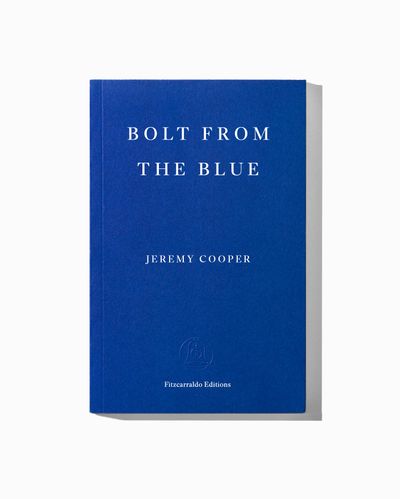
Bolt from the Blue
French paperback with flaps, 272 pages
Published 27 January 2021
Bolt from the Blue
To keep things straightforward and, as far possible, honest, I have precisely transcribed all the postcards and letters, later emails, I could find between my mother and me from my moving down to London in October 1985 until her death in August 2018. It turns out that we each kept a fair number through thirty years of moves and marriages. Mum’s letters to me I had stacked in date order in an empty drawing-paper box in my studio, inside their envelopes, the emails in a folder of consecutive printouts. My letters to her I found in a jumble at the back of a clothes drawer, emails on her low-tech old PC in a file titled GIRL. The arrival of the internet and email does not appear to have much affected the way Mum and I wrote to each other. My last words to her were on a postcard. We were hooked by then into set habits of language and form. Subjects changed with time, as did the relationship, the basic structure of our connection hardly at all.
My letters and postcards and emails were always dated, hers never. Not all the time-gaps are due to missing letters, as one or other of us, usually both, regularly went silent. I can also see that some absences of information in the letters may be due to the intervention of our very occasional telephone calls. This does not explain all the empty months, nor the way some letters refer to the contents of another letter which no longer exists. Dozens of letters were allowed to disappear. There may be an explicit reason why, for example, the year 1987 is almost a complete letter-blank, together with the first half of 1988, but it is too long ago for me to meaningfully recall the circumstances. Several significant occurrences to fill various gaps over the years do spring arbitrarily to mind, in visual detail, without my knowing why there are no letters recording the event. In more recent years I was frequently away, researching and making my films, then showing them, often abroad, too preoccupied to write and uncontactable by Mum.
While I can remember a few of the letters from me that Mum did not keep, most of the absences are lost in the mist. I prefer to leave them there, in limbo. My policy is to look forward not back. Cut off and move on. My motto.
Some of Mum’s letters which I do not have I tore up and threw away within seconds of reading them, they made me so angry. Others have simply vanished, maybe left by me in a jacket pocket and discarded by the dry cleaners, or abandoned by mistake on a café table. Neither of us were great letter-writers anyway. Even if I had them all, the narrative they tell would still be partial. Nothing is ever complete, everything always a version. An illusion to imagine that diligent research and enquiry, about anything or anyone, can produce the whole story. There is no such thing.
This is what I have.
Period.
Patterns coalesce, sometimes by chance, at other times by design.
It took years, but our contact did seem to find, in time, a worthwhile rhythm, tightness and tedium giving way to a skewed sense of connection and care.
The letters tell only a tiny part of what has happened to me as an adult. They offer even fewer details of Mum’s life.
Re-reading this correspondence was a disturbing experience.
I cannot deny that these are my words and yet they do not feel like me. A depleted with-mother me? Although flashes of my actual presence are seen in a fair number of thoughts which I still hold today, this remains a selective misrepresentation of who I am. The temptation to add and improve, to remove repetition, tone down my rants, was considerable.
I am pleased that I managed to resist. Because inconsistency, contradiction and exaggeration I have come to accept as the marks of reality, proof that, however inadequate in terms of communication and inaccurate as history, these letters are right. True, in my seeing, gathered by me for myself alone and not for others.
(…)
‘A novel written in epistolary form, Cooper has maximised the potential of this literary convention to achieve a work of great depth and quiet power. Over three decades, a mother and her artist daughter communicate only by letters, excavating their relationship as it evolves with melancholic, astute precision. At times spellbinding and mesmerising, the work also proves provocative and inspirational. As much a love letter to the lost art of letter-writing as it is a thirty year-long dialogue of familial love, Cooper has produced an understated book that nonetheless resonates powerfully. This book is deeply sensitive to the ebb and flow of relationships over time and the way love is disguised, expressed and experienced, and it achieves that elusive dream of all authors and finds new meaning in the recording of life.’
— Helen Cullen, Irish Times
‘Bolt from the Blue is a venturesome, epistolary fiction spanning over 30 years.’
— Catherine Taylor, Financial Times
‘A novel in epistolary form, the writer and art historian’s latest work is both an intimate account of a mother-daughter relationship and a lively history of London’s art scene. It is October 1985 when Lynn moves to the capital to study at Saint Martin’s, later making a successful career as an artist. She and her mother, who is back at home in Birmingham, begin a 30-year-long written relationship – via letters, postcards and emails. Their contact is irregular, and by turns affectionate and combative, making the relationship feel engrossing, deep and utterly true.’
— New Statesman
‘The chief pleasures of the novel, for me, were its gentleness and light, skipping pace. Cooper casts human flaws as tender foibles, and moves the reader along quickly through the years, all while exploring large themes of familial estrangement, class division, ruthlessness, and loneliness. And there is no heavy, lyrical prose here. These themes come in unspoken hints, buried within chatty updates and loaded postcard choices…. Despite its arty conceptual trapping, Bolt from the Blue has the texture of actual personal relations. As a result the mother-daughter relationship feels frustrating, understandable, funny, tragic, and very close to real.’
— Suki Ferguson, Mechanics’ Institute Review
‘Layers upon layers of “fictioning” make Bolt from the Blue a nuanced and beautifully textured novel. Cooper’s text takes on a mercurial uncertainty, blurring the boundaries between author and subject, person and persona, and truth and falsehood. Versions of people and narratives emerge and re-emerge, coming together to present an incomplete image of how a relationship unfolds through time.’
— Anna Souter, Burlington Contemporary
‘The book becomes deeply intimate thanks to the two women’s distinctive voices and the effect of three decades upon their dynamic. The result is a memorable portrait of difficult love, and a captivating tour of the London art scene.’
— Publishers Weekly
‘Cooper has carefully crafted Bolt from the Blue, in all its slipperiness, so that we are looking for answers and explanations, even though there might be none. In this way, we are nudged into a mode of intense, pleasurable close reading, one that the novel frustrates and at the same time rewards.’
— Sophie Haigney, The Nation
‘Jeremy Cooper’s work is consistently haunting and layered, built on a refreshing trust in the reader to delve deeper behind the quiet insinuations of his prose. His work resists every modern accelerant, creating a patient and precise tonic. He is easily one of the most thoughtful British fiction writers working today.’
— Adam Scovell, author of How Pale the Winter Has Made Us
‘Bolt from the Blue is a scintillating, wistful exploration of a good career and a poor relationship. Pithy yet expansive, it’s an essential, engrossing, illuminating read for any aspiring artist.’
— Sara Baume, author of Handiwork
‘There’s a strange magic to Jeremy Cooper’s writing. The way he puts words together creates an incantatory effect. Reading him is to be spellbound, then. I have no idea how he does it, only that I am seduced.’
— Ben Myers, author of The Offing
‘For a book that has the word “love” on almost every page, Bolt from the Blue is endlessly inventive in showing us how love is often hidden, rationed, coded and disguised. It is an epistolary dialogue between a life of possibilities – as shown through the maturing vision of an artist – and one of disappointments, expressed through the wise and seasoned scepticism of the artist’s mother. Jeremy Cooper is a deft and sensitive writer who understands how to entrust his book to his characters.’
— Ronan Hession, author of Leonard and Hungry Paul
Praise for Ash before Oak
‘Low-key and understated, this beautiful book … is a civilised and melancholy document that slowly progresses towards a sense of enduring, going onwards, and even new life. It feels like a healing experience.’
— Phil Baker, The Sunday Times
‘A study in how writing can give lives meaning, and in how it can fail to be enough to keep one afloat, this is a rare, delicate book, teeming with the stuff of real life.’
— Publishers Weekly, starred review

